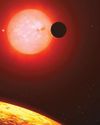Prøve GULL - Gratis
Non-sugar sweeteners don't help with weight loss
How It Works UK
|Issue 178
Non-sugar sweeteners (NSS) shouldn’t be used to reduce body weight, according to newly released guidance from the World Health Organisation (WHO)

The United Nations (UN) health agency’s report also suggested that long-term use of such sweeteners may come with health risks.
Announced on 15 May, the new recommendations are based on a systematic review of evidence. The review includes more than 280 studies of both low- and no-calorie synthetic sweeteners, like aspartame, and natural extracts, like stevia. The findings suggest that using NSS in place of sugar does not have any long-term benefits in reducing body fat in either adults or children.
The review also suggests that long-term use of these sweeteners may be linked to a slightly increased risk of type 2 diabetes, cardiovascular diseases and early death from any cause in adults.
Denne historien er fra Issue 178-utgaven av How It Works UK.
Abonner på Magzter GOLD for å få tilgang til tusenvis av kuraterte premiumhistorier og over 9000 magasiner og aviser.
Allerede abonnent? Logg på
FLERE HISTORIER FRA How It Works UK

How It Works UK
UNCANNY'S DANNY ROBINS
The creator and host of the BBC's Uncanny series tells us about his most chilling experiences while researching the show, and writing a ghost book for children
4 mins
Issue 208

How It Works UK
HOW FEATHERS GROW
A bird's proteinaceous plumage comes from the same source as our hair
1 mins
Issue 208

How It Works UK
New EV battery technology could power 500-mile road trips on a 12-minute charge
Scientists have used a neat chemistry trick to tackle a major challenge facing future batteries.
2 mins
Issue 208

How It Works UK
HOW AIR PURIFIERS WORK
These filtration devices clean a room's air of particles that can make a person sick
1 min
Issue 208

How It Works UK
Chinese scientists hunt for alien radio signals in a 'potentially habitable' star system
TRAPPIST-1 is a red dwarf star located about 40 light years away that hosts seven Earth-sized rocky planets, with at least three orbiting in the habitable zone where liquid water could exist.
2 mins
Issue 208

How It Works UK
WHAT HAPPENS WHEN WE DIE?
Our bodies are vessels for life, but in death they undergo a cascade of chemical and biological changes
3 mins
Issue 208

How It Works UK
WHY ARE KEYBOARDS QWERTY?
There's a reason why this seemingly random arrangement of letters is widely used on keyboard layouts
1 min
Issue 208

How It Works UK
A 'quasi-moon' discovered in Earth orbit may have been hiding for decades
A new paper describes a possible 'quasi-moon' of Earth, an interloping asteroid that may have been following our planet around for decades, undetected.
1 mins
Issue 208

How It Works UK
WHAT'S AN ANTI-DRONE GUN?
How these devices intercept and disable unmanned aerial vehicles
1 mins
Issue 208

How It Works UK
Dozens of mysterious blobs discovered inside Mars may be 'failed planets'
Giant impact structures, including the potential remains of ancient ‘protoplanets’, may be lurking deep beneath the surface of Mars.
2 mins
Issue 208
Translate
Change font size
